Dagstuhl Seminar 17082
Shape-Changing Interfaces
( Feb 19 – Feb 22, 2017 )
Permalink
Organizers
- Jason Alexander (Lancaster University, GB)
- Sean Follmer (Stanford University, US)
- Kasper Hornbaek (University of Copenhagen, DK)
- Anne Roudaut (University of Bristol, GB)
Contact
- Annette Beyer (for administrative matters)
Shape-changing interfaces are physically-dynamic surfaces that co-locate input and output for communication with a computing device. These interfaces combine and exploit our rich visual and tactile senses, capitalising on our inherent ability to understand, process, and interpret physical 3D artefacts. In some instances, a display overlays the input/output surface to create a physically-dynamic shape-changing display. Examples of shape-changing interfaces include shape-changing 2.5D displays, handheld devices (mobile phones) that self-modify their shape, and shape changing input controllers. Compared to traditional human-computer interaction (e.g. mouse and keyboard, touchscreen), shape-changing interfaces can better convey on-screen content, exploit perceived affordances in physical form, enhance output by exploiting the users’ rich tactile sense, influence social behaviours, and re-appropriate objects through dynamic affordances. Their dynamic features offer new possibilities for more naturalistic or efficient interaction techniques.
Shape-changing interfaces is an immature research field, but recent breakthroughs in Advanced Materials, Robotics and Autonomous Systems, Synthetic Biology, and Interactive Technologies could significantly advance this research domain. We believe the time is right to bring together a multi-disciplinary group of researchers to map out a research agenda and to understand how experts from different fields will need to work in tandem to develop these novel interfaces from low-fidelity prototypes into high-resolution products. We aim to discuss the current state-of-the-art in shape-changing interfaces, explore the research challenges of this emerging field, and develop a research agenda for the area. We will base our discussion on three key areas of investigation:
- Technology: shape-changing interfaces (especially shape-changing displays) are currently built as ‘one-off’ research prototypes with significant technological limitations. HCI researchers have developed these devices to evaluate their usefulness and investigate novel user interactions, but do not have the skillsets or expertise to increase their resolution and robustness. Recent advances in the material sciences, displays, and robotics domains will help to address these shortcomings. In the technology theme, the seminar will aim to better understand the state-of-the-art in advanced materials, produce a common language between expertise groups, and understand the technological needs and motivations of end users.
- Design and Applications: The design of shape-changing interfaces is crucial to make them functional, easy to use, meaningful, and readily exploitable. However, they pose a range of new design challenges not present in traditional user interface development. Designers no longer have an interface with defined size, shape, or form, and may not know its physical configuration until after an interaction is performed. This seminar theme will explore current theories, practices, and techniques for interaction design, their applicability to shape-changing interfaces, and examine methods for designing applications for these novel devices.
- User Experience and Evaluation: is key to assessing the success of shape-changing interfaces. User experience concerns the users’ perceptions and responses that result from the use or anticipated use of shape-changing interfaces; research in this area provides well-defined metrics for when interaction is successful. However studying shape-changing devices is difficult because (1) the space of potential shapes and deformations to study is of very high dimensionality and impossible to investigate as individual factors in a controlled experiment; (2) the working prototypes are low-fidelity and too fragile to put in user’s hands; high fidelity prototypes require more design iteration and thus time to produce; and (3) experience with such devices spans visual, tactile, and haptic components in addition to factors concerning aesthetics, agency, and affordance; these are hard to evaluate in-depth simultaneously. This seminar theme will examine current progress into user experience and evaluation, successful and unsuccessful methodologies, and explore new avenues for evaluation.
 Jason Alexander, Sean Follmer, Kasper Hornbæk, and Anne Roudaut
Jason Alexander, Sean Follmer, Kasper Hornbæk, and Anne Roudaut
The Shape-Changing Interfaces Dagstuhl seminar aimed to bring together researchers from the disciplines of Computer Science, Design, Engineering, Robotics and Material Science to strenghten this new communinity, discuss grand challenges, form a research agenda, and to create opportunities for active collaborations.
Shape-changing interfaces use changes in physical geometry to convey input and output and are emerging as an alternative interaction method for communicating with computers. Discussions at the seminar were based around three key themes: (1) The technologies involved in shape-change, including soft and modular robotics, smart materials, and mechanical actuation. (2) The design of shape-changing interfaces, including their key application areas, and their industrial and interaction design. (3) The user experience of shape-changing interfaces, including evaluations of such interfaces and psycho-physical evaluation results.
To encourage active discussion, the seminar had no keynote speakers, but instead used brainstorming activities and small working-groups to understand challenges, explore the literature, and plan an agenda. Specifically, the following sessions were run:
[Benefits and Applications of Shape-Change:] A whole-group brainstorming session developed categories of benefits and potential application areas for shape-changing interfaces.
[Related Work:] Small working-groups focused on one of five related-work areas (materials, hardware, experience and interaction, design, or applications), researched, and then presented summaries of the five ground-breaking and five most over-looked works in that sub-field.
[Grand Challenges:] A whole-group brainstorming session generated ideas and themes of grand challenges, small working groups then took a theme and dug deeper into the challenge, generating avenues of work and research agendas.
[Worst Case Scenarios:] To understand why this field could fail, a brainstorming exercise asked participants to develop a series of `failure' situations---these were used as a method of creating awareness of the reasons progress in this field could stall.
[Personal Reflections:] To conclude the seminar, four participants were asked to provide their personal reflections on the experience, and their key take-home messages.
The seminar was attended by 25 researchers from around the world; all of who found the experience invaluable. This report outlines the key findings of these sessions.
 Jason Alexander, Sean Follmer, Kasper Hornbaek, and Anne Roudaut
Jason Alexander, Sean Follmer, Kasper Hornbaek, and Anne Roudaut
- Jason Alexander (Lancaster University, GB) [dblp]
- Miguel Bruns Alonso (TU Eindhoven, NL) [dblp]
- Céline Coutrix (Universität Stuttgart, DE) [dblp]
- Pierre Dragicevic (INRIA Saclay - Orsay, FR) [dblp]
- Aluna Everitt (Lancaster University, GB) [dblp]
- Sean Follmer (Stanford University, US) [dblp]
- Audrey Girouard (Carleton University - Ottawa, CA) [dblp]
- Marianne Graves Petersen (Aarhus University, DK) [dblp]
- Fabian Hemmert (Universität Wuppertal, DE) [dblp]
- Trevor Hogan (Cork Institute of Technology, IE) [dblp]
- Kasper Hornbaek (University of Copenhagen, DK) [dblp]
- Yvonne Jansen (UPMC - Paris, FR) [dblp]
- Matt Jones (Swansea University, GB) [dblp]
- Hyunyoung Kim (Universität Stuttgart, DE) [dblp]
- Majken Kirkegaard Rasmussen (Aarhus University, DK) [dblp]
- Panos Markopoulos (TU Eindhoven, NL) [dblp]
- Diego Martinez Plasencia (University of Sussex - Brighton, GB) [dblp]
- Timothy Merritt (Aarhus University, DK) [dblp]
- Isabel Qamar (University of Bristol, GB)
- Anne Roudaut (University of Bristol, GB) [dblp]
- David Schmelzeisen (RWTH Aachen, DE)
- Jürgen Steimle (Universität des Saarlandes, DE) [dblp]
- Sriram Subramanian (University of Sussex - Brighton, GB) [dblp]
- Roel Vertegaal (Queen's University - Kingston, CA) [dblp]
- Helge A. Wurdemann (University College London, GB) [dblp]
Classification
- society / human-computer interaction
Keywords
- Shape-changing interfaces
- user interfaces
- materials
- robotics
- smart materials

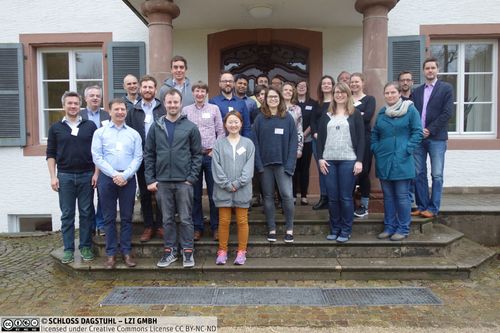
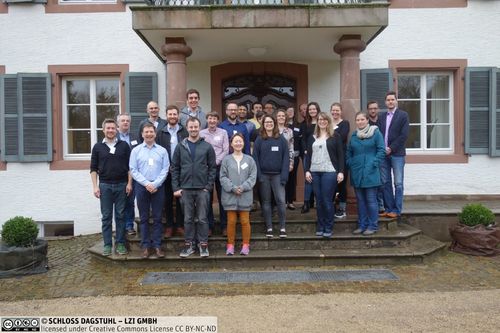
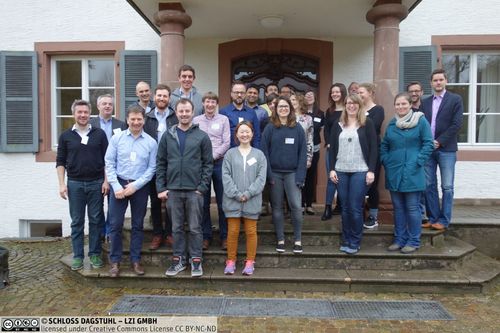
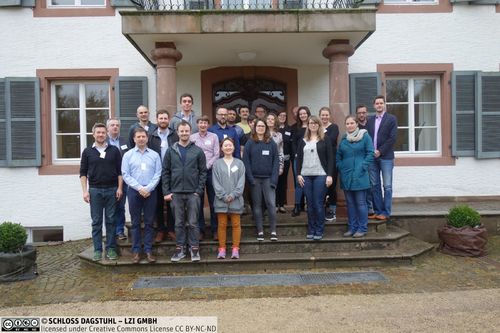
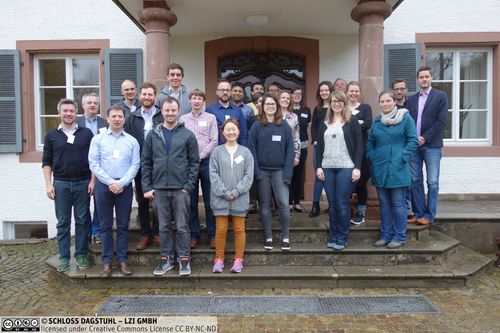
 Creative Commons BY 3.0 DE
Creative Commons BY 3.0 DE
